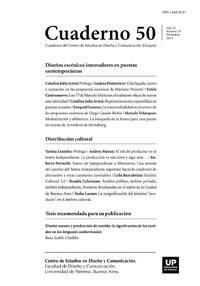Mediatización y diferencia. La búsqueda de la forma para una puesta en escena de Acreedores de Strindberg
Abstract
Strindberg wrote Creditors in 1888. He didn´t wrote for his time but to come.
The big problem in Creditors is a discursive one. Adolfo, Tekla and Gustavo, wage a “war
of minds” a psychological struggle and purely spoken. Thrown into the world and unable
to tell reality they get trapped in this “prison of language”, which is also ours. This new
staging of Creditors seeks a shift from the traditional canons of aesthetic realism and naturalism in which the author has been categorized as part of his work. If Creditors raises
the question about the art form, this question still guides us: What is the contemporary
form for this play of 1888? What is the form that corresponds to the art of our time? We
ventured some answers in the signs of staging: inclusion. If Strindberg produces immersed
in a great crisis of representation, the proposal is to remove the work to separate it from
the visible representative and do not hide the wires that make up the representation. Thus
we read Creditors, after more than a century of its writing, and it is our way of approaching modernity
References
Alegre, J. R. (2006). Giro lingüístico y corrientes actuales de la filosofía. Influencias wittgensteinianas. Instituto de Filosofía, Facultad de Humanidades, UNNE, Resistencia, Chaco.
Deleuze, G. (2006). Diferencia y repetición. Buenos Aires: Amorrortu.
Foucault, M. (2002). Las palabras y las cosas. Buenos Aires: Siglo XXI editores.
Pasolini, P. P. (1987). Calderón. Barcelona: Icaria Editorial.
Scavino, D. (2007). La filosofía actual. Pensar sin certezas. Buenos Aires: Paidós.
Strindberg, A. (2008). Los camaradas. El padre. Señorita Julia. Acreedores. Buenos Aires:
Losada.
Los autores/as que publiquen en esta revista ceden los derechos de autor y de publicación a "Cuadernos del Centro de Estudios de Diseño y Comunicación", Aceptando el registro de su trabajo bajo una licencia de atribución de Creative Commons, que permite a terceros utilizar lo publicado siempre que de el crédito pertinente a los autores y a esta revista.


